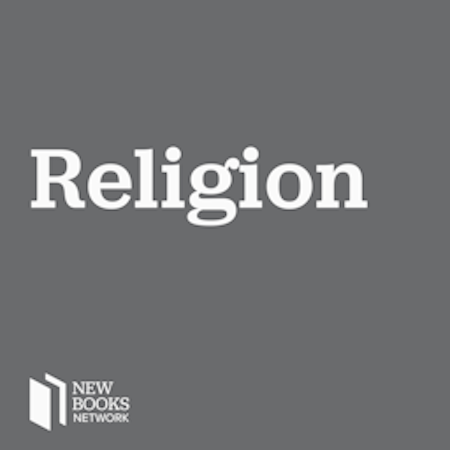
New Books in Religion
This podcast is a channel on the New Books Network. The New Books Network is an academic audio library dedicated to public education. In each episode you will hear scholars discuss their recently published research with another expert in their field.
Discover our 150+ channels and browse our 28,000+ episodes on our website: newbooksnetwork.com
Subscribe to our free weekly Substack newsletter to get informative, engaging content straight to your inbox: https://newbooksnetwork.substack.com/
Follow us on Instagram and Bluesky to learn about more our latest interviews: @newbooksnetwork
1826
Julia Cassaniti, "Remembering the Present: Mind...
How do you understand mindfulness?
98 min
1827
Nazia Kazi, "Islamophobia, Race, and Global Pol...
Kazi's book is a brilliant and powerful meditation on the intersection and interaction of Islamophobia, racism, and U.S. imperial state power...
43 min
1828
Lynn Kaye, "Time In The Babylonian Talmud: Natu...
Kaye examines how rabbis of late antiquity thought about time through their legal reasoning and storytelling, and what these insights mean for thinking about time today...
49 min
1829
Jackson Wu, "Reading Romans with Eastern Eyes: ...
What does it mean to “read Romans with Eastern eyes”?
45 min
1830
Jessica Starling, "Guardians of the Buddha’s Ho...
Starling invites us into the daily lives of the bōmori, the spouses of priests in the Japanese Jōdo Shinshū, or True Pure Land, tradition...
56 min
1831
Laury Silvers, “The Lover” (Kindle Direct Publi...
Laury Silvers discusses her transition from writing scholarship to historical fiction...
66 min
1832
Markus Zehnder, "New Studies in the Book of Isa...
Zehnder looks at the enigmatic figure of the ‘Servant of the Lord.’
30 min
1833
Amy Collier Artman, "The Miracle Lady: Kathryn ...
Artman tells the story of Kuhlman’s life and, in the process, relates the larger story of charismatic Christianity, particularly how it moved from the fringes of American society to the mainstream...
57 min
1834
Peter Jan Margry, "The Miracle of Amsterdam: Bi...
According to tradition, on the night of March 15, 1345, a Eucharistic host thrown into a burning fireplace was found intact hours later...
63 min
1835
John Stratton Hawley, "Bhakti and Power: Debati...
What is the relationship between religion and power?
47 min
1836
Courtney Pace, "Freedom Faith: The Womanist Vis...
Pace examines Hall’s life and philosophy, particularly through the lens of her civil rights activism, her teaching career, and her ministry as a womanist preacher...
53 min
1837
David Slucki, "My Funeral: A Memoir of Fathers ...
Slucki’s memoir blends the scholarly and literary, grounding the story of his grandfather and father in the broader context of the twentieth century...
34 min
1838
Ricardo Cubas Ramacciotti, "The Politics of Rel...
Ramacciotti provides a lucid synthesis of the Catholic Church’s responses to the secularization of the State and society...
56 min
1839
Naftali Rothenberg, "Rabbi Akiva’s Philosophy o...
Is love between man and woman the source of wisdom and the cornerstone of moral life?
45 min
1840
Betsy Perabo, "Russian Orthodoxy and the Russo-...
Perabo examines the conflict through the concept of an “interreligious war” between Christian and Buddhist nations...
46 min
1841
Marko Geslani, "Rites of the God-King: Śānti an...
Is “Vedic” fire sacrifice at odds with “Hindu” image worship?
56 min
1842
Robert Louis Wilken, "Liberty in the Things of ...
Wilken offers a revisionist history of how the ideas of freedom of conscience and freedom of religion originated in the writings of the Christian fathers of the early Church, such as Tertullian and Lactantius, during the period when Christians were a persecuted sect of the Roman Empire...
59 min
1843
Emily S. Johnson, "This Is Our Message: Women's...
Johnson examines the lives and work of four well-known women-evangelical marriage advice author Marabel Morgan, singer and anti-gay-rights activist Anita Bryant, author and political lobbyist Beverly LaHaye, and televangelist Tammy Faye Bakker...
47 min
1844
Diana Pasulka, "American Cosmic: UFOs, Religion...
More than half of American adults and more than seventy-five percent of young Americans believe in intelligent extraterrestrial life...
55 min
1845
Melvin C. Johnson, "Life and Times of John Pier...
Hawley was an active member of several Latter Day Restoration denominations in Missouri, Illinois, Iowa, Kansas, Wisconsin, Texas, the Indian Nations of Oklahoma, and Utah Territory from 1838 to 1909...
76 min
1846
Christopher J. H. Wright, "The Old Testament in...
Some people find the Old Testament to be confusing, out of date, and essentially replaced by the New Testament. They are missing out...
36 min
1847
Ashley Thompson, "Engendering the Buddhist Stat...
Thanks to the international tourism industry most people are familiar with the spectacular ruins of Angkor, the great Cambodian empire that lasted from about the 9th to the early 15th century...
40 min
1848
George Kinder, "A Golden Civilization and the M...
Kinder states “If we want our children to live in a Golden Civilization, the first step is for each of us to imagine it.”
56 min
1849
Darren Dochuk, "Anointed with Oil: How Christia...
Dochuk places religion and oil at the center of American history...
48 min
1850
Joan Wallach Scott, "Sex and Secularism" (Princ...
"Sex and Secularism" is a compelling analysis of the discourse of secularism in the modern democratic (imperial) nation-states of “the West”.
57 min